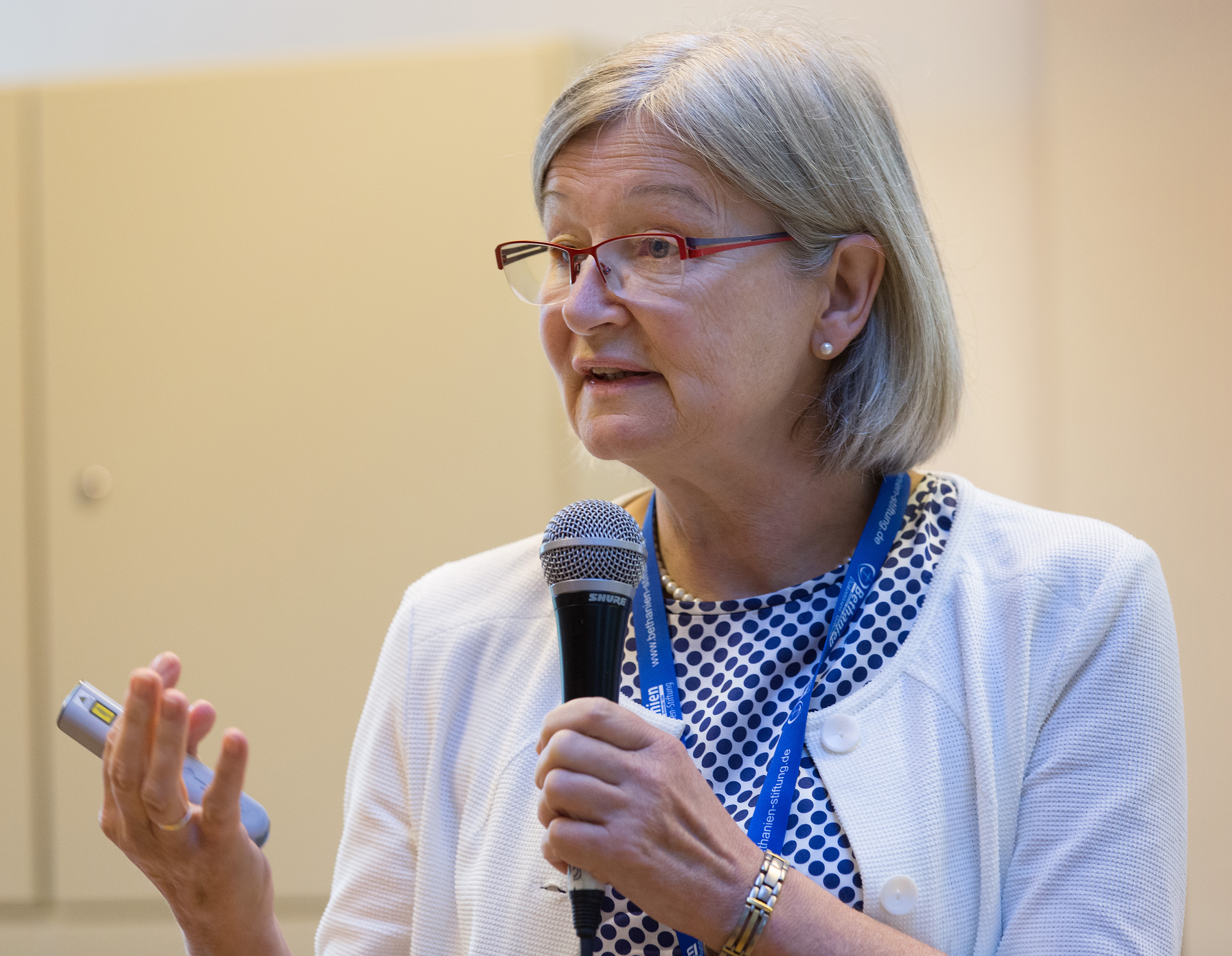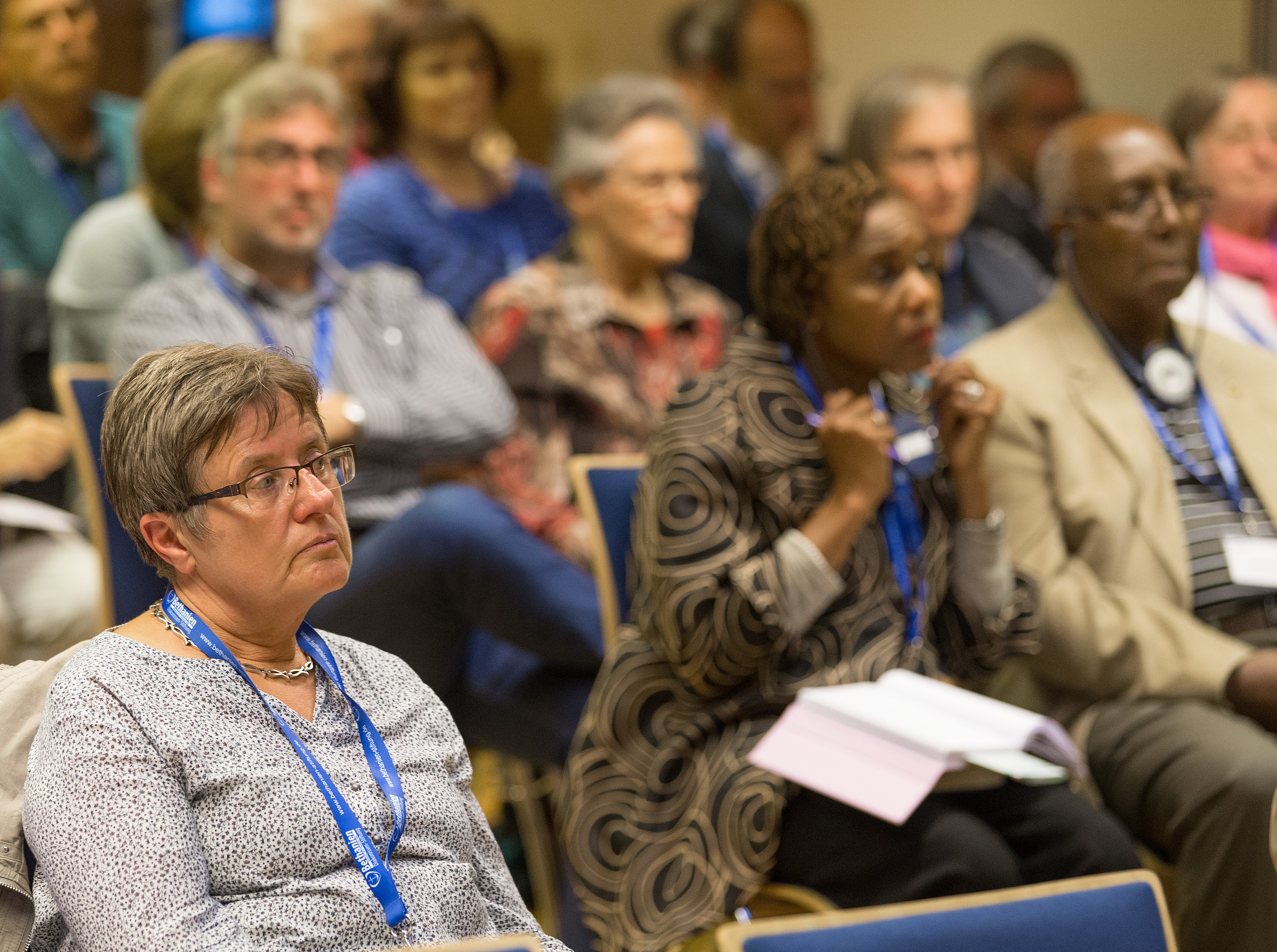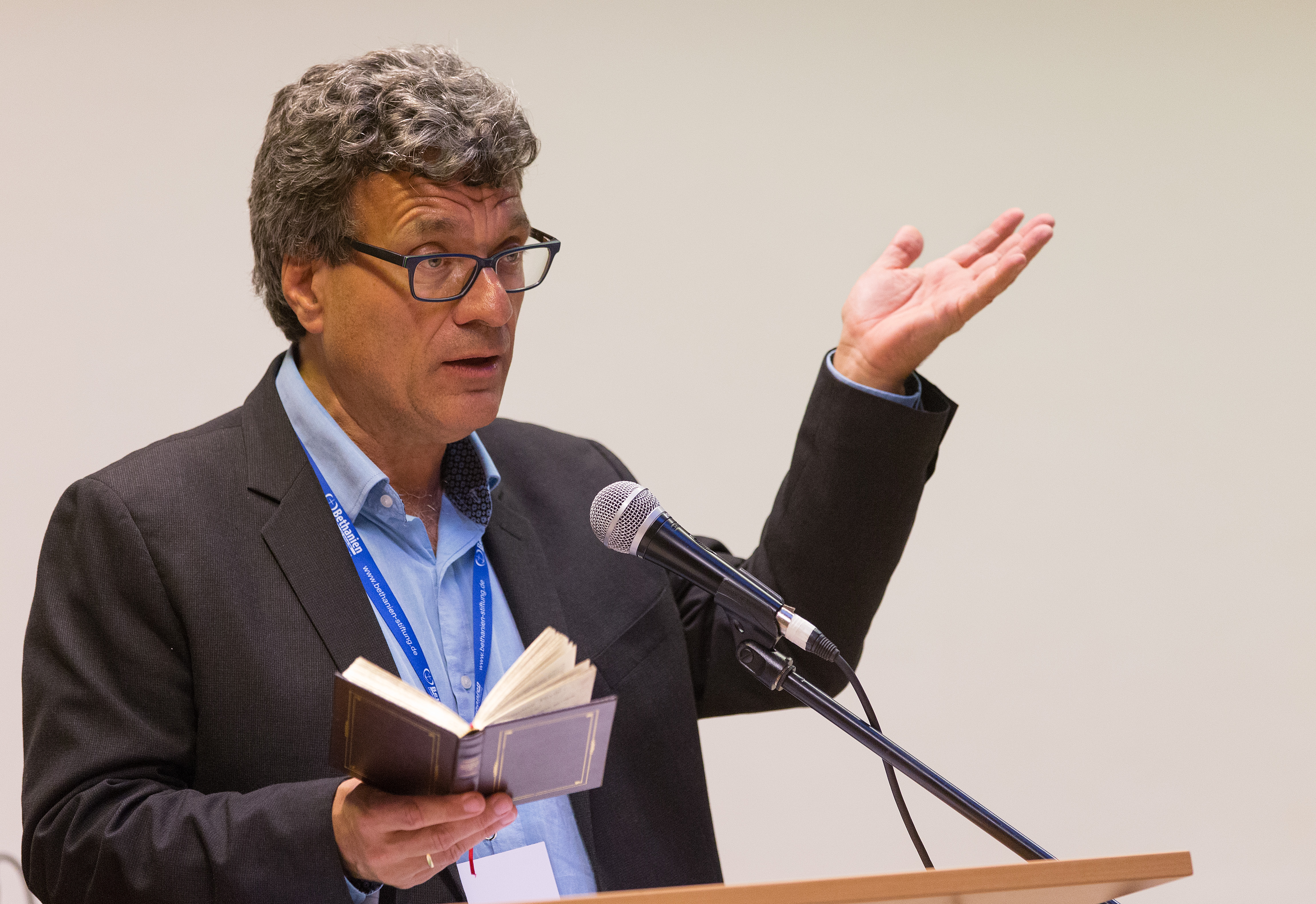The church continues to have a unique role to play in global health care through an infrastructure that reaches the most remote corners of society, one speaker at an international United Methodist health forum said.
Other speakers, including the head of Global Health for the United Methodist Board of Global Ministries, talked about how churches can help address inequities in access to health care, clean water and fresh food.

Dr. Beate Jakob addresses the International Health Forum of The United Methodist Church in Stuttgart, Germany. Jakob said the need for churches to play a role in health care was apparent during the Ebola outbreak that began in 2014 in Africa. Photo by Mike DuBose, UMNS.
The need for churches to play a role in health care was apparent during the Ebola outbreak that began in 2014 in Africa, said Dr. Beate Jakob, a consultant for Health and Healing with DIFAEM, Deutsches Institut für Ärztliche Mission e.V, or the German Institute for Medical Mission.
“There was fear and panic and churches tried to capture the fears of the people and work with small villages and towns to have awareness campaigns,” Jakob said. “The no-touch policy was tricky because Jesus touches people. And the burial rights went against local culture, which created a medical problem.”
The outbreak of the deadly hemorrhagic fever killed more than 11,000 people, mostly in Sierra Leone and Liberia. During the outbreak, United Methodist Communications sent texts containing prevention information and prayers on behalf of the bishop to United Methodist clergy. Other non-profit organizations also joined the United Methodist texting program.
While governments provided help at the height of the crisis, once it was clear Ebola wasn’t going to reach the U.S. or Europe and the outbreak was under control, many pulled out, Jakob said. But church organizations stayed, fighting both the stigma of the survivors and the secondary health problems, she said.
Jakob spoke at “Healing Faith — Healing Congregations and the Church,” an international health forum sponsored by United Methodist Global Ministries and the Bethanien Diakonissen-Stiftung, or the Bethany Deaconess Foundation. The foundation runs a health care company connected with The United Methodist Church in Germany. The forum, held Sept. 24-28, was attended by about 50 people.

Participants, some using translation equipment, listen to a presentation at the International Health Forum of The United Methodist Church in Stuttgart, Germany. Photo by Mike DuBose, UMNS.
Dr. Olusimbo Ige, executive director of Global Health for the United Methodist Board of Global Ministries, agreed that churches have a unique role in disseminating information about health.
“If the bishop or the pastor says this is good, people believe it,” she said.
Ige spoke about how the Abundant Health campaign of The United Methodist Church, led by Global Ministries, tries to address inequities in access to health care, clean water and food.
In Germany, the whole population has access to health care, compared to African countries like Nigeria where 10 to 20 percent of the population has access.
Ige said the United Nations approached Global Ministries about collaborating on efforts to reduce child mortality.
Around the world, The United Methodist Church is making a difference for health, she said. “We distributed 10,000 mosquito nets last year in Nigeria,” she said.
Forum organizers
The forum was hosted by the Bethany Deaconess Foundation, the United Methodist Board of Global Ministries, the South Germany Conference of The United Methodist Church, the Martha and Mary Diaconal Foundation, Reutlingen School of Theology and Adult Education.
In addition, Global Ministries has provided refugee support in Uganda, where the entire health board of the South Sudan Conference now lives in a refugee camp, she said. “They had to run for their lives and ended up in Uganda,” she said. More than 1 million refugees fleeing violence and civil war in South Sudan are now in Uganda, according to the BBC.
In the United States, 20 conferences and 204 churches have committed to working to improve health, she said. Churches already have set up farmer’s markets in food deserts (areas where people drive more than 10 miles to get fresh food) and are supporting school gardens.
Churches are involved in child-nutrition programs for indigenous people, after-school programs and programs to fight substance abuse, Ige said.
Before the forum, participants from the U.S. visited United Methodist hospitals and health systems, including the Bethanien Hospital in Frankfurt, the Martha Maria Hospital in Nűmberg and Zeisigwaldkliniken Bethanien Hospital in Chemnitz. All those hospitals were originally started and operated by United Methodist deaconesses.

Thomas Kemper quotes from the book "Primitive Physick," written by John Wesley, the founder of Methodism, during the opening of the International Health Forum of The United Methodist Church in Stuttgart, Germany. The book, first published in 1747, was intended to bring practical medical advice to workers and others who could not afford private doctors. Kemper is top staff executive of the denomination's Board of Global Ministries. Photo by Mike DuBose, UMNS.
Thomas Kemper, top executive of United Methodist Global Ministries, thought the visits by Americans to U.S. hospitals would foster a better connection between United Methodist health care in the two countries.
One thing he said he would like to see come from the health care forum is more “tri-lateral” work in Africa, with churches and health care organizations in the U.S. and Germany working to improve health in partnership with Global Ministries. He noted that the German church already works with Ganta United Methodist Hospital in Liberia and Chicuque Rural Hospital in Mozambique — and both hospitals receive support from Global Ministries and United Methodists in the U.S.
Kemper said he also hopes the forum will help hospitals consider what is “the right governance so that Methodist values become visible.”
The Rev. Lothar Elsner, one of the forum organizers, said the forum was designed to help United Methodists understand that healing is “not only for hospitals, but for our churches.”
Elsner is president of the Bethanien Diakonissen-Stiftung, a health care company connected with The United Methodist Church in Germany.
He would like to explore partnerships between the annual conferences in the U.S. and Germany, as well as between the Methodist health care organizations in the two countries. One possible collaboration would be staff exchanges, he said.
Read the second story in our report on the international United Methodist health forum, Churches have much to offer in health care.
Brown is editor of United Methodist News Service. Contact her at [email protected] or 615-742-5470. To read more United Methodist news, subscribe to the free Daily or Weekly Digests.
Like what you're reading? Support the ministry of UM News! Your support ensures the latest denominational news, dynamic stories and informative articles will continue to connect our global community. Make a tax-deductible donation at ResourceUMC.org/GiveUMCom.







